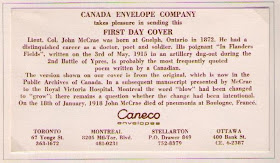[In 1968, the Canada Post Office issued two stamps honouring Canadian soldiers who fought in World War I. Two earlier posts are re-published today : Armistice and John McCrae]
Vimy Ridge

The Battle of Vimy Ridge after a painting by Richard Jack.
Canadians successfully attacked the German-held strongpoint of Vimy Ridge, April 9-12, 1917. The thoroughly planned and executed victory has become a post-war symbol for Canadian identity and independence.
The Vimy Memorial

After the War, the Vimy Memorial was built on land granted by France to the Canadian people.
The imposing structure was designed by Walter Allward, one of Canada's most famous sculptors. Allward began work on the Vimy memorial in 1925 and completed it 11 years later at a cost of $1.5 million. It is adorned by 20 allegorical figures representing faith, justice, peace, honour, charity, truth, knowledge, and hope. A key figure, "Canada mourning her fallen sons," speaks to the country's wartime losses. The Vimy Memorial is inscribed with the names of 11,285 Canadians who were killed on French soil and have no known graves.
Vimy Memorial Unveiling 1936
On July 16, 1936, five trans-Atlantic liners departed the port of Montreal for the unveiling of the Canadian National Vimy Memorial. The Vimy Memorial was unveiled in July 1936 to a crowd of more than 100,000.

Posted on board the S.S. Montrose, July 23, 1936 and mailed at Antwerp, July 25, 1936
Antwerp "Paquebot" handstamp

S.S. Montrose handstamp

Souvenir Post Card issued by the French Post Office
Vimy, Canadian Memorial, July 26, 1936 cancellation

Canada Post Office issued a 15 cent commemorative stamp on October 15, 1968 featuring the Vimy Memorial, to mark the 50th anniversary of the end of World War I.
First Day Covers
Canada Post Office Replacement/Presentation First Day Cover




H & E

Usages
Domestic

Fredericton to Midland, Ontario, December 19, 1968
6 cents forward letter + 40 cents special delivery fee
International Air Mail

London to Kornwestheim, Germany, December 17, 1968
15 cents air mail letter rate to Europe

Toronto to Prague, December 10, 1968
15 cents air mail letter rate to Europe

Lieutenant Colonel John Alexander McCrea (1872-1918) , born in Guelph, Ontario, was a Canadian poet, physician, author and soldier who wrote the famous war memorial poem "In Flanders Fields":
In Flanders Fields the poppies blow
Between the crosses, row on row,
That mark our place; and in the sky
The larks, still bravely singing, fly
Scarce heard amid the guns below.
We are the Dead. Short days ago
We lived, felt dawn, saw sunset glow,
Loved, and were loved, and now we lie
In Flanders fields.
Take up our quarrel with the foe:
To you from failing hands we throw
The torch, be yours to hold it high.
If ye break faith with us who die
We shall not sleep, though poppies grow
In Flanders fields
In Flanders Fields was first published in England's Punch magazine in December 1915. Within months, this poem came to symbolize the sacrifices of all who were fighting in the First World War. Today, the poem continues to be a part of Remembrance Day ceremonies in Canada and other countries throughout the world.
On January 28, 1918, while still commanding No 3 Canadian General Hospital at Boulogne, France, McCrae died of pneumonia.
An excellent biography of John McCrae has been posted on the Guelph museum website.
1. Slogan Cancellations
In 1968, a slogan cancellation honouring John McCrae was in use at the Guelph Post Office:
BIRTHPLACE OF COL. JOHN McCRAE
SOLDIER POET
AND PHYSICIAN
Guelph, October 25, 1968
McCrae's poem inspired the adoption of the poppy as a symbol of remembrance for those who died in war. In 1972, a second John McCrae-related slogan was used in Guelph:
CANADA'S POPPY CITY LA VILLE DU COQUELICOT
Guelph, April 19, 1972
2. John McCrae Stamp
On October 15, 1968, Canada Post Office issued a stamp honouring John McCrae.
a) First Day Covers


Canada Post Office Presentation/Replacement First Day Covers

H & E
Overseas Mailers

Canada Envelope Company

Shering
elliot-marion

David Pritchard

Usages
International Surface Letter

Gabriela, B.C., to Goteburg, Sweden, October 22, 1966
10 cents UPU surface letter rate
On November 1, 1968, the UPU surface letter rate was increased to 12 cents
NATO Forces in Europe

CFPO Soest, Germany to Toronto, November 4, 1968
15 cents air mail letter rate to Canada
Printed Matter to the U.S.
On November 1, 1968, the printed matter rate to the U.S. increased from 3 cents to 5 cents.

Lethbridge to Port Orchard, Wahington, December 13, 1968
5 cents printed matter rate to the U.S.
This is a correct single usage of the McCrae stamp after November 1, 1968.



